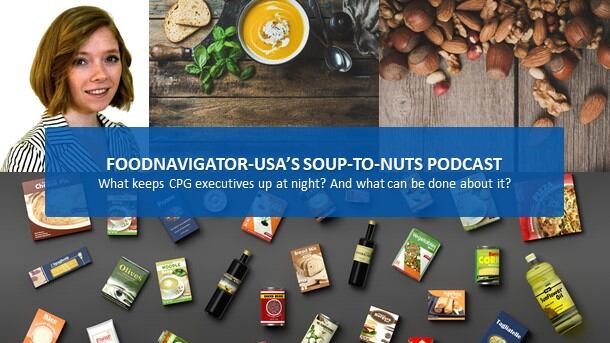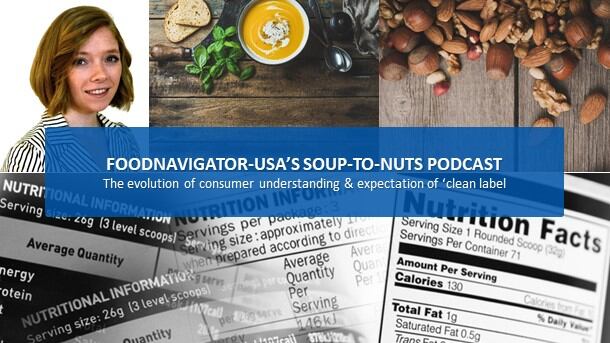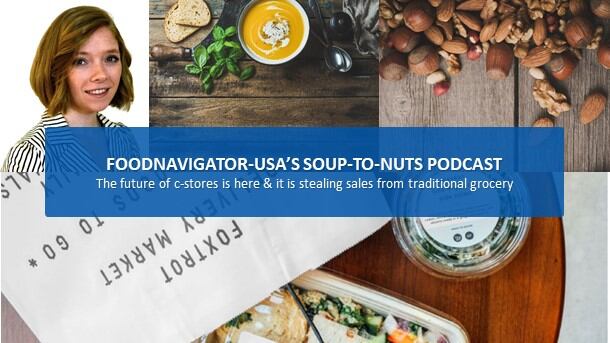According to a survey of 28 CEO and top-level executives who are members of the Consumer Brands Association, which was formerly the Grocery Manufacturers Association, consumer held the most influence over their decision-making process. CBA argues that this makes consumers – not shareholders, not lawmakers – “the de factor regulator of the industry.”
And yet, the survey also found many of the top challenges that the CPG industry faces are not visible to consumers. According to CBA’s Industry View 2020 report, the top fears keeping CGP executives up at night are how to maintain consumer trust, the threat of patchwork state regulation, sustainability, supply chain struggles and the potential impact of the upcoming election on already strained international relationships.
To learn more about the extent of these challenges and what CBA and industry players are doing to address them, I’m joined in this episode of FoodNavigator-USA’s Soup-To-Nuts podcast with Katie Denis, who is the senior director of industry narrative at CBA.
[Editor’s Note: Never miss another episode of FoodNavigator-USA’s Soup-To-Nuts podcast – subscribe on iTunes.]
Maintaining consumer trust is a top concern
With 86% of CEOs ranking the consumer as having the most influence on their decision-making, it should come as no surprise that earning and maintaining their trust is a top priority for the CPG industry. And as illustrated by the survey, Denis notes, it is also a top concern.
“Consumer trust really is the currency of the relationship between the CPG company and the consumer. So, I don’t think it’s surprising that when we were asking about what the threats to that trust were that you’ve got the top three all kind of in the same family. It’s all about reliable information or lack of reliable information. Misinformation was the top one. Conflicting science or untrue claims,” also were up there, she said.
Patchwork state legislation hinders companies
As important as protecting consumer trust and cultivating that relationship is, CBA found it is far from the only concern on top of CEOs’ minds. According to the report, CPG executives ranked on a scale of one to seven, with one being the lowest, their concerns about complying with a patchwork of state regulations as a 5, complying with federal regulations as 4.52 and complying with California’s Prop. 65 and other disclosure regulations a 4.37.
“Our ability to scale as an industry is what allows us to deliver things reliably, affordably to consumers. Patchwork state regulations represent a problem for that scale. So you can't make a different product for California that you do for Illinois that you do for Iowa. You know, it just doesn't really work like that,” said Denis.
She noted that CBD “is the ultimate example of patchwork regulation,” as FDA struggles with how to regulate the ingredient.
Given the mounting pressure and interest in CBD, CBA recently formed an advisory board to guide the organization’s work to enhance safety and oversight of the CBD market. It also recently asked Congress for additional funding for CBD research and oversight.
Cultivating sustainability
Sustainability is another top concern for CPG leaders, according to the survey results, which revealed more than nine in ten respondents estimate they spend more time on sustainability issues today than they did five years ago.
“It is not lost on this industry that it’s selling packaged goods and those come, inherently, in a package. So making sure that packaging is as sustainable as possible is top of mind,” Denis said.
She noted that CBA is actively working with legislators and industry to address the nation’s broken recycling program.
“Right now our recycling system is failing us. It’s 10,000 different jurisdictions, 10,000 sets of rules. It’s confusing to consumers. We need to fix it,” she said.
In addition, she noted, “of the 25 largest CPG companies, 80% of them are committed to fully recyclable packaging by 2030 at the latest.”
Streamlining transportation
Following sustainability, managing transportation costs is another threat that looms larger for CPG companies. According to the CBA’s survey, one-fifth of CEOs rated the likelihood of transportation costs impacting their business as a six or seven on a scale of one to seven with seven being highly significant.
“Some of the transportation costs that skyrocketed, particularly in the later half of 2018 … is a massive issue and it certainly affects all sorts of things,” Denis said. “It’s the relationship with retailers because, obviously, they’re the ones selling the products. And it’s how do we find that balance? How do we make sure that we don’t have to pass costs on that?”
Executives sweat the big and small stuff
While industry can take steps to address many of these fears, there are some issues over which they have less control – including the potential influence of the 2020 election on trade. CBA notes that the CPG industry’s exports have grown 148% in the past 15 years from $41.5 billion in 2003 to $102.7 billion in 2018 – outpacing growth in both manufacturing and total US goods exports. And, as Denis notes, many industry leaders worry this could become a risk factor depending on how politics play out.
While CPG leaders worry about the influence of macro issues, such as the election and international trade, they also sweat the small stuff. According to CBA’s survey, attracting and retaining top talent at their businesses is also a top concern – especially as the low unemployment rate continues to place pressure on companies to offer more to employees.
Based on these survey results and other communications with its membership, the CBA plans to tackle many of these shared 10,000-foot concerns in the coming years. In particular, Denis said, the association will push forward on streamlining key regulations, improving supply chain management, supporting sustainability efforts and building trust with industry and consumers alike.




